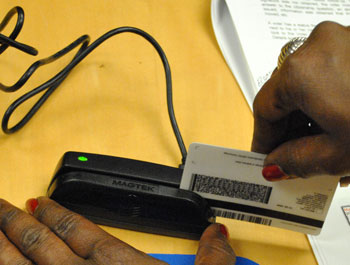New Technology for Tech Bond Election
On Tuesday, May 8, Ann Arbor voters will be asked to approve a bond to support investments in technology for Ann Arbor Public Schools. And it turns out that new technology will play a part in the Ann Arbor city clerk’s implementation of the election.

A driver's license can be swiped for automatic lookup in the electronic pollbooks that will be deployed at eight precincts for the May 8 election. The voting process itself will take place using the usual paper ballots.
In eight of the city’s 37 precincts, election workers will deploy electronic pollbooks (EPBs) – information downloaded onto laptop computers (the night before the election) from the state’s qualified voter file. (The count of 37 precincts arises from the combination of several of the city’s usual 48 precincts for this local election.)
The laptops are supplied to the city of Ann Arbor by the state of Michigan through the Help America Vote Act. Michigan’s secretary of state’s office told The Chronicle in a phone interview that of Michigan’s roughly 1,500 different municipalities across Michigan about 800 will use EPBs in the May election, and more than 1,000 will use them in the August primaries. In 2009 40 different municipalities had tested the system.
Ann Arbor is piloting the EPBs in eight precincts this spring, with an eye toward expanding citywide by the November 2012 presidential election. Voters in the eight precincts won’t need to do anything different to prepare to vote. The voting itself won’t take place electronically. Voters will still fill in ovals on paper ballots. EPBs are simply for pollworkers to check in voters and perform record-keeping tasks at the precinct through voting day.
The eight precincts where EPBs will be deployed on May 8 are 1-8 (Skyline High School), 1-10 (Arrowwood), 2-5 (Ann Arbor Assembly of God), 2-7 (King Elementary School), 4-4 and 4-8 combined (Pioneer High School), 5-3 (Second Baptist Church), 5-6 (Eberwhite School), and 5-11 (Forsythe Middle School).
Voters will have mostly the same experience voting that they’ve always had. For example, they’ll still need to bring a photo ID. If that ID is in the form of a Michigan driver’s license, a voter might enjoy an incrementally faster check-in time at the polls. That’s because election workers will be able to scan a driver’s license for automatic lookup in the EPB.
The city clerk trained election inspectors in the use of EPBs at three sessions last week. The Chronicle attended the Thursday, April 26 session. [Full Story]



